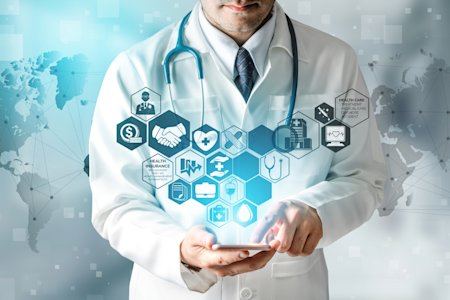The modern world witnesses an undeniable entwining of technology and healthcare, shaping the way we diagnose, treat, and manage health conditions. As electronic health records replace paper files, and telemedicine bridges the distance between patients and providers, the digital transformation is both a boon and a challenge. Recent global events have further accelerated the digital push in healthcare, magnifying the role of technology.
However, with these advancements come vulnerabilities. Cyberattacks targeting medical data and systems have demonstrated a pressing need. Now, more than ever, the emphasis on cybersecurity in healthcare is not just about safeguarding data—it's about ensuring patient safety, preserving trust, and maintaining the very functionality of our healthcare infrastructure.
What is Healthcare Cybersecurity?
Healthcare cybersecurity refers to the strategies, technologies, and practices designed to protect electronic health records (EHRs), medical devices, and other sensitive healthcare data from unauthorized access, cyberattacks, and data breaches. This field focuses on safeguarding patient information, ensuring the integrity of medical systems, and maintaining the overall security of healthcare infrastructures.
The Rise of Cyber Threats in Healthcare
The healthcare sector, traditionally seen as an unlikely target, is increasingly facing cyber threats. In recent times, healthcare has ascended the ranks to become one of the industries most frequently targeted by cybercriminals.
The real-world implications of these attacks are profound. Consider the widespread ransomware attack on a major hospital chain, which paralyzed operations for several days, causing delays in crucial treatments and endangering patient lives. Another alarming event was the data breach of a prominent healthcare provider, exposing the personal and medical records of millions of patients. Such events underscore the vulnerabilities in our digital health infrastructure.
These incidents serve as a wake-up call to the ever-present and escalating cyber risks in the healthcare domain. The sensitive nature of medical data, combined with the essential services that healthcare institutions provide, renders them especially enticing targets for malicious cyber activities.
4 Popular Cybersecurity Threats in Healthcare
Healthcare organizations are frequent targets for cybercriminals due to the sensitive nature of patient data. Here are four of the most common threats impacting the industry today:
Ransomware Attacks: Cybercriminals encrypt critical medical data and demand payment to restore access. These attacks can halt hospital operations and put patient care at risk.
Phishing Scams: Attackers use deceptive emails or messages to trick staff into revealing login credentials or downloading malware, often leading to unauthorized access.
Insider Threats: Employees or contractors with legitimate access may intentionally or unintentionally expose patient data by mishandling records or falling for social engineering tactics.
Unsecured Medical Devices: IoT devices and legacy systems often lack modern security features, making them easy entry points for attackers to infiltrate networks and extract data.
Why Healthcare is a Prime Target for Cyber Attacks
The healthcare sector, with its invaluable reservoir of data and often antiquated systems, stands out as an alluring target for cybercriminals. At the heart of this appeal are healthcare records, which brim with a rich blend of personal and medical data, offering a goldmine for malicious actors seeking to exploit this information for financial gain or other nefarious purposes.
Amplifying this vulnerability is the fact that many healthcare institutions still rely on outdated legacy systems. These aging infrastructures, lacking modern security measures, become easy entry points for attackers. Additionally, the vast and complex networks of healthcare operations, characterized by a myriad of interconnected devices sourced from different manufacturers, add layers of complication to security protocols. Each device represents a potential weak link, making the entire system more susceptible to breaches. In sum, the confluence of rich data, old systems, and intricate networks makes healthcare a prime and lucrative target for cyber threats.
Key Challenges in Healthcare Cybersecurity
Healthcare organizations face unique cybersecurity hurdles due to the complexity and sensitivity of their operations. Key challenges include:
Outdated Systems and Software: Many hospitals and clinics rely on legacy infrastructure that lacks modern security features, making them more vulnerable to attacks and harder to patch.
Limited IT Resources: Small and mid-sized healthcare providers often lack dedicated cybersecurity personnel or budgets, leaving them exposed to evolving threats.
High Volume of Connected Devices: The growing number of IoT and medical devices increases the attack surface and can be difficult to monitor and secure consistently.
Complex Compliance Requirements: Navigating HIPAA and other healthcare regulations requires constant oversight and documentation, which can strain already stretched IT teams.
The Consequences of Cyberattacks on Healthcare
The ripple effects of cyberattacks on the healthcare sector are multifaceted, with potential repercussions touching every corner of an institution and, most importantly, its patients.
Patient Safety: When healthcare systems face cyber interruptions, the immediate threat isn't just technological – it's human. A compromised system can delay or misinform treatments, posing grave risks. For instance, if a hospital's electronic health record system is attacked, clinicians might be unable to access critical patient data, leading to potential misdiagnoses or inappropriate treatments.
Data Breaches: Beyond immediate operational concerns, cyberattacks often target the treasure trove of sensitive patient information held by healthcare institutions. A breach can expose personal data, medical histories, and other confidential details, making patients vulnerable to identity theft and other forms of exploitation.
Operational Disruption: The machinery of modern healthcare is intricate. An attack can stall everything from routine appointments to critical surgeries. Beyond immediate patient care, there's also the disruption of research, administrative work, and supply chain logistics, all of which can have cascading effects on healthcare delivery.
Financial Implications: The aftermath of a cyberattack doesn't end with restoring systems and data. Healthcare institutions might face significant financial burdens, from fines for data breaches to the costs of system repairs. Lawsuits from affected patients or parties can further exacerbate financial strain. And perhaps most damaging in the long run is the reputational loss, which can erode trust and deter potential patients.
In essence, the impact of a cyberattack on healthcare is not just a temporary technical glitch but a complex web of patient risks, operational halts, and long-lasting financial and reputational damages.
The Importance of Cybersecurity in Healthcare Industry
To build a resilient defense against cyber threats, healthcare institutions can adopt several strategies:
Regular Risk Assessments: Regularly evaluating and identifying vulnerabilities in the system ensures that security measures evolve with the ever-changing threat landscape.
Employee Training: Human error often acts as an entry point for cyber threats. Regular training sessions can educate staff about the latest threats and best practices to counteract them.
Multi-layered Defense: Employing a multi-layered security approach—combining firewalls, intrusion detection systems, and encryption—ensures comprehensive protection.
Device Management: With a plethora of interconnected devices in healthcare, it's crucial to keep them updated with the latest security patches and to segregate critical devices from regular networks when feasible.
Incident Response Planning: Having a well-defined and rehearsed incident response plan ensures that, in the event of a breach, the institution can act swiftly to contain and mitigate the damage.
Backup Systems: Regular data backups, especially for critical patient information, can provide an immediate recovery path in case of ransomware attacks or data corruption.
In conclusion, as healthcare navigates its digital future, cybersecurity remains its steadfast protector. It's not just about protecting bytes of data, but about safeguarding the trust patients place in healthcare institutions and, most crucially, ensuring the uninterrupted care those patients depend on. Properly implemented cybersecurity measures are, in essence, a testament to an institution's commitment to its core mission of healing and care.
Best Practices for Robust Healthcare Cybersecurity
To ensure a strong defense against cyber threats and safeguard sensitive patient data, healthcare organizations should implement a comprehensive set of best practices for cybersecurity. Here are key strategies to enhance healthcare cybersecurity:
Implement Multi-Factor Authentication (MFA): Use MFA to add an extra layer of security beyond just passwords, requiring additional verification steps to access sensitive systems and data.
Regularly Update and Patch Systems: Ensure all software, including medical devices and EHR systems, is up-to-date with the latest security patches to protect against known vulnerabilities.
Conduct Regular Security Training: Provide ongoing training for healthcare staff to recognize phishing attempts, avoid risky behaviors, and follow cybersecurity protocols.
Encrypt Sensitive Data: Utilize strong encryption methods for data at rest and in transit to protect patient information from unauthorized access and breaches.
Implement Access Controls: Apply the principle of least privilege by granting access rights only to those who need them, and regularly review and adjust access permissions.
Develop and Test Incident Response Plans: Create detailed incident response plans to address potential security breaches and regularly test these plans through simulations to ensure readiness.
Monitor Network Activity: Use advanced monitoring tools to detect unusual activity or potential threats in real-time, allowing for prompt action to mitigate risks.
Backup Data Regularly: Perform regular backups of critical data and ensure backups are stored securely and can be quickly restored in case of a ransomware attack or data loss.
Secure Medical Devices: Ensure that all connected medical devices are properly secured, including changing default passwords and keeping device firmware up-to-date.
Compliance with Regulations: Adhere to industry regulations and standards, such as HIPAA, to maintain legal compliance and ensure robust protection of patient data.
By following these best practices, healthcare organizations can better protect themselves from cyber threats and maintain the confidentiality, integrity, and availability of their critical systems and patient data.
Ensuring Cybersecurity with Splashtop’s Remote Access Software for Healthcare
Splashtop's remote access software empowers healthcare professionals and organizations to safeguard both their own and their patients' critical data. Here's how:
Ensuring Data Protection and Compliance: In a field where patient trust is paramount, Splashtop stands tall, backing its services with top-tier industry compliances, such as SOC2, HIPAA, and PCI. The platform's innate capability to customize security policies allows institutions to tailor solutions to their specific requirements, upholding both compliance and the integrity of sensitive patient data.
Unparalleled Accessibility: Gone are the days when healthcare professionals were tethered to specific locations or devices to access vital patient information. With Splashtop, professionals can access Electronic Health Records (EHR) from any location, ensuring that no matter where they are — be it an office, exam room, or another department — vital patient data is always within reach.
Enhanced Diagnostic Capabilities: High-end medical software systems require optimal performance for accurate sample analysis. Splashtop’s high-performance remote access ensures that healthcare professionals can utilize these software systems from anywhere, ensuring timely and precise patient care.
Streamlined IT Operations: For healthcare institutions, maintaining smooth IT operations is just as crucial as patient care. With Splashtop, IT teams can remotely monitor, maintain, and provide on-demand support to devices, ensuring uninterrupted service delivery and freeing up time for practitioners to prioritize patients.
Convenience with Remote Printing: Need to print a patient record while off-site? Splashtop makes it possible. Its remote print feature empowers healthcare professionals to securely print documents from anywhere, ensuring data remains both accessible and updated.
Guaranteed Data Security: As data is transmitted remotely, its security becomes a prime concern. Splashtop ensures that this data remains uncompromised with encrypted data transfer, providing professionals the confidence they need when accessing remote systems.
Strengthened Access Security: The addition of multi-factor authentication ensures that only authorized individuals have access, bolstering security measures and preventing potential unauthorized intrusions and breaches.
In essence, Splashtop's remote access solutions for healthcare aren't just a tool; they're a comprehensive solution, aligning with the multifaceted needs of modern healthcare. It offers a seamless blend of security, accessibility, and efficiency, ensuring that healthcare professionals can deliver the best possible care, regardless of where they are.
Conclusion
Let's face it: as healthcare dives deeper into the digital realm, the stakes rise dramatically. We're not just talking about interesting tech tools; we're safeguarding real lives and genuine trust. So, when we talk about cybersecurity in healthcare, it's not just tech talk—it's about maintaining our patients' confidence and ensuring smooth sailing in our roles. That's why cybersecurity is of paramount importance.
As tech evolves, we need to stay sharp and prepared. If you're looking for a reliable partner in this digital journey, Splashtop's got your back. Want to experience it for yourself? Learn more about Splashtop's remote access software for healthcare and sign up for a free trial!





